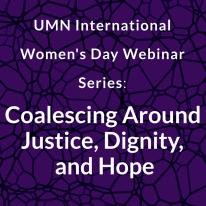- Project REACH (Rural Experts Advancing Community Health) is a year-long program that provides community leaders in rural Minnesota with health policy and leadership training to address local health challenges. In 2021, three leaders from rural Minnesota were selected and have worked on projects focusing on the social isolation of older adults in the Iron Range, access to prenatal care for Native American women in Itasca County, and youth mental health and policy.
- The Rural Health Equity Postdoctoral Fellowship is the first in the nation to focus on rural health equity. These fellows promote the lived experiences of rural residents and work toward translating clinical research into evidence to guide and inform health policy.
- The Rural Health Collective brings together a group of University centers, organizations, staff, faculty, and students whose research and education focuses on rural people and places. The Collective aims to improve health, quality of life, and resources for rural communities throughout Minnesota and across the U.S.
Wherever there are challenges, there are also successes and innovations to celebrate. What are some ways rural communities have served as a model of inspiration for you?
Partnering with Communities
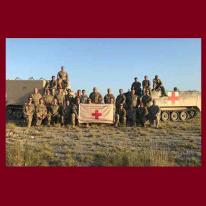
Double Duty: Simulation Educators and Combat Medics
By day, Eugene Floersch, Jon Chaika, and Ana Brakke serve as part of the team at M Simulation, where they help design and deliver simulated training experiences for health sciences learners at the University as preparation for clinical practice. Last August, Chaika and Brakke were part of the medical unit of the Minnesota National Guard that was activated to help secure the airport in Kabul during the evacuation of Americans and Afghans.
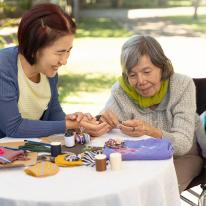
Grassroots, Volunteer-Led Dementia Friends Offers Interprofessional Learning Opportunities for Future Clinicians
Dementia Friends USA is part of a global movement designed to change the way people think, act and talk about dementia. By becoming a Dementia Friend, participants acknowledge the unique role each of us could play in the lives of people living with dementia in our community. At the U of M, Dementia Friends offers opportunities for interprofessional learning and community outreach. Sign up for a Dementia Friends information session to learn more about dementia, what it’s like to live with the disease, and how to turn your understanding into action that supports people living with dementia.
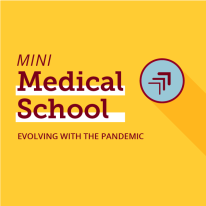
Register for Mini Medical School: Evolving with the Pandemic
Join us for the free, virtual Mini Medical School: Evolving with the Pandemic, starting Wednesday, March 30, noon to 1 p.m. This three-week series will explore the latest on COVID-19, the impact of the pandemic on rural communities and geriatric populations, emotional wellbeing and resilience in a time of anger and burnout, and how together we can reimagine health and society.
Advancing Interprofessional Education & Training
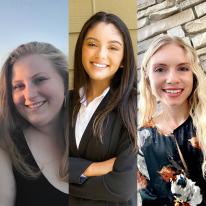
OACA Interprofessional Internship Spotlight: Community-University Health Care Center
Mila Centrella, BA, from the School of Public Health, Vanessa Santamaria, BS, from the School of Public Health, and Ally Taubenheim, RN, PHN, BSN, from the School of Nursing are working with Community-University Health Care Center (CUHCC) to understand current patient satisfaction survey requirements, map annual workflows, and develop a structure for reports in the peer review process. “The project has impacted our future work as health care professionals by challenging us to bring our ideas together to represent patient satisfaction data in a transparent and viewer-friendly way," said the team.
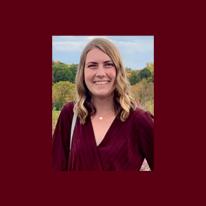
Students: What Do You Enjoy Most About Interprofessional Activities?
“Through the Phillips Neighborhood Clinic, Interprofessional Geriatric Case Competition and the IPE Scholars program, my learning has been enhanced to view every patient with a more holistic approach to make sure that we are caring for every aspect of their life. I envision using what I learn throughout my interprofessional activities in my future career as I hope to work in a setting where I am a part of a care team or care conference when caring for a patient.” - Kayla Fingerson, SPT, Doctor of Physical Therapy
Driving Innovation & Discovery

Identifying and Addressing Gaps in Health Outcomes Using the Health Capability Profile
Current theoretical approaches to bioethics and public health ethics propose varied justifications as the basis for health care and public health, yet none capture a fundamental reality: people seek good health and the ability to pursue it. Health Capability is a concept in public health ethics that considers various individual and societal factors that determine people’s abilities to achieve optimal health outcomes. This talk, hosted by the Center for Bioethics on March 4, introduces the Health Capability Profile and how it was used in identifying and addressing gaps in health.
U-Wide Events and Opportunities
Hosted by six U of M centers and units, including OACA's Center for Global Health and Social Responsibility, this three-part webinar series will celebrate International Women’s Day 2022. Events will explore intersections of global women’s health, public policy, human rights, ethics, and more, and are meant to generate ideas for interprofessional collaboration and action. The final event on March 10, "The Power of Personal Stories and Communities to Reduce Disparities in Global Maternal Health," will feature opening remarks from Rep. Ilhan Omar.

Sustainability and Energy Expo
This online conference is an opportunity for students to present their work in sustainability to their peers as well as discover what other students are working on. Submissions are being accepted now through March 7 to present a lightning talk, poster, or multi-media/creative work. All students (post-doctoral, graduate, professional and undergraduate) across all U of M campuses are eligible to submit an abstract. Prizes will be awarded for the presentations that best communicate sustainability.

